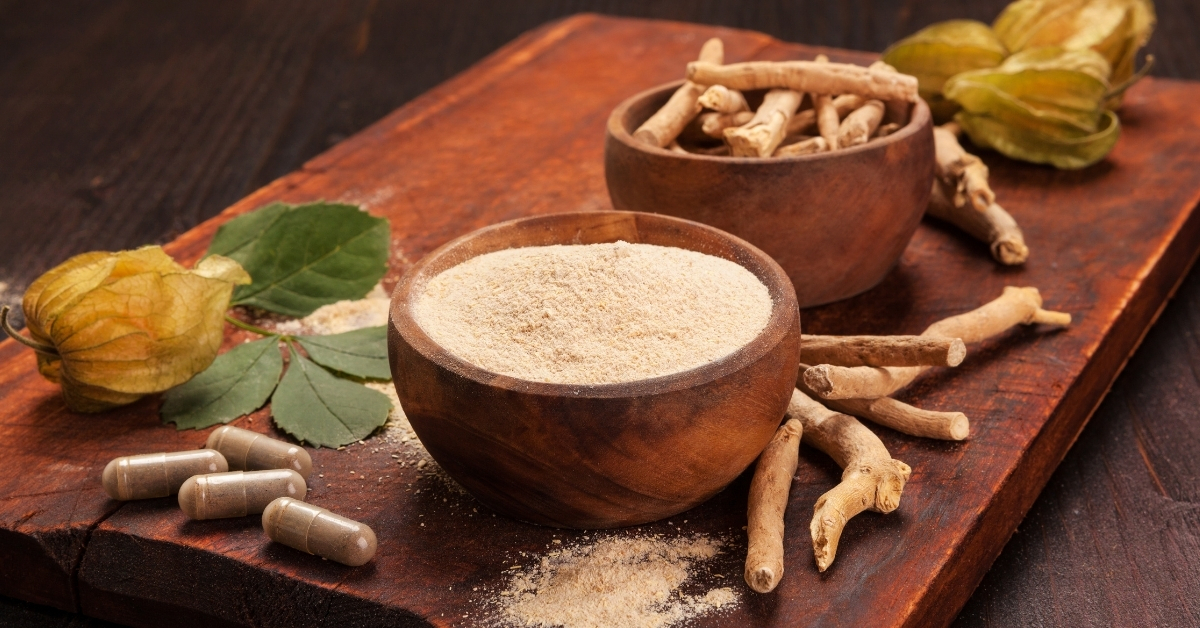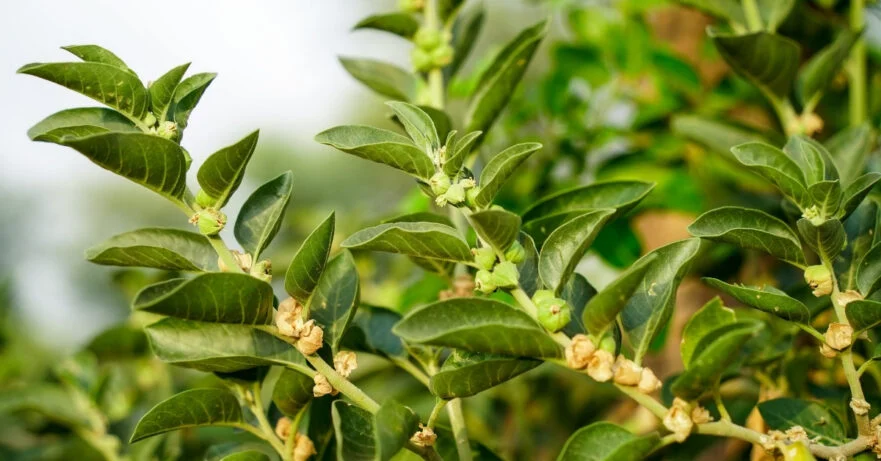In this monograph about ashwagandha:
📖 Introduction | 🌱 Botanical Description | 📜 Traditional Uses | 🔍 Phytochemistry | ✨ Applications and Uses | 🛡️ Safety Profile
📖 Introduction
Ashwagandha, known scientifically as Withania somnifera, is a prominent herb in the Ayurvedic medical system, often referred to as “Indian ginseng.” Valued for its adaptogenic and rejuvenating properties, it is a cornerstone in traditional Indian medicine for enhancing vitality and health.
| English Name | Ashwagandha |
| Latin Name | Withania somnifera |
| Parts Used | Root |
| Traditional Uses | Boosting energy, reducing stress, enhancing stamina |
| Herbal Actions | Adaptogen, tonic, anti-inflammatory |
🌱 Botanical Description
Scientific Classification
Withania somnifera is part of the Solanaceae family.
Physical Characteristics
This shrub has oval leaves and small, greenish flowers. It bears red fruit and has a central root system that is tuberous and fleshy, which is primarily used for medicinal purposes.
Natural Habitat and Cultivation Details
Native to dry regions in India, North Africa, and the Middle East, ashwagandha thrives in arid climates and stony soils. It is commonly cultivated in similar environments around the world.
📜 Traditional Uses
Traditionally, ashwagandha roots are used to strengthen the immune system, increase energy, and mitigate the effects of stress and anxiety. It is also reputed to have aphrodisiac properties. In Ayurveda, it is employed to balance various bodily systems.

🔍 Phytochemistry (Active Constituents)
Ashwagandha contains several key phytochemicals, which include:
- Withanolides: Steroidal lactones noted for their anti-inflammatory, antitumor, and immunomodulatory properties.
- Alkaloids: Including withanine and other alkaloids that contribute to its stress-reduction and neuroprotective effects.
- Saponins: These possess antioxidant capabilities and help in modulating immune responses.
✨ Applications and Uses
Ashwagandha is utilized in herbal medicine to:
- Support adrenal function: Ashwagandha helps modulate stress responses, reducing anxiety and depression. Studies have shown that it can lower cortisol levels and improve symptoms of stress and anxiety, contributing to better overall mental health.
- Enhance energy and cognitive function: Ashwagandha may boost brain function and alleviate fatigue. Studies have shown improved cognitive performance, including sustained attention and working memory.
- Improve sexual and reproductive health: Ashwagandha may enhance fertility and vigor, supporting overall reproductive health. Studies have indicated that it can improve sperm quality and increase testosterone levels, which may help in addressing male infertility.
Research findings suggest that ashwagandha’s adaptogenic properties are central to its effectiveness in these applications, helping the body resist physical and mental stress.
🛡️ Safety Profile
Ashwagandha is generally safe for most individuals when used in moderation.
However, potential side effects include mild to moderate gastrointestinal issues, such as upset stomach and diarrhea, particularly at higher doses.
Due to its potency, it should be used under the guidance of a healthcare provider, especially for those with thyroid conditions or those on thyroid medication, as it may alter thyroid hormone levels.
Pregnant and nursing women are advised to avoid Ashwagandha due to insufficient safety data and potential risks such as miscarriage. Additionally, it may interact with other sedatives, enhancing their effects, or with immunosuppressive drugs.
Consulting with a healthcare provider before beginning any new herbal regimen is advisable.
📃 Related Posts
🌱 Related Herbs

